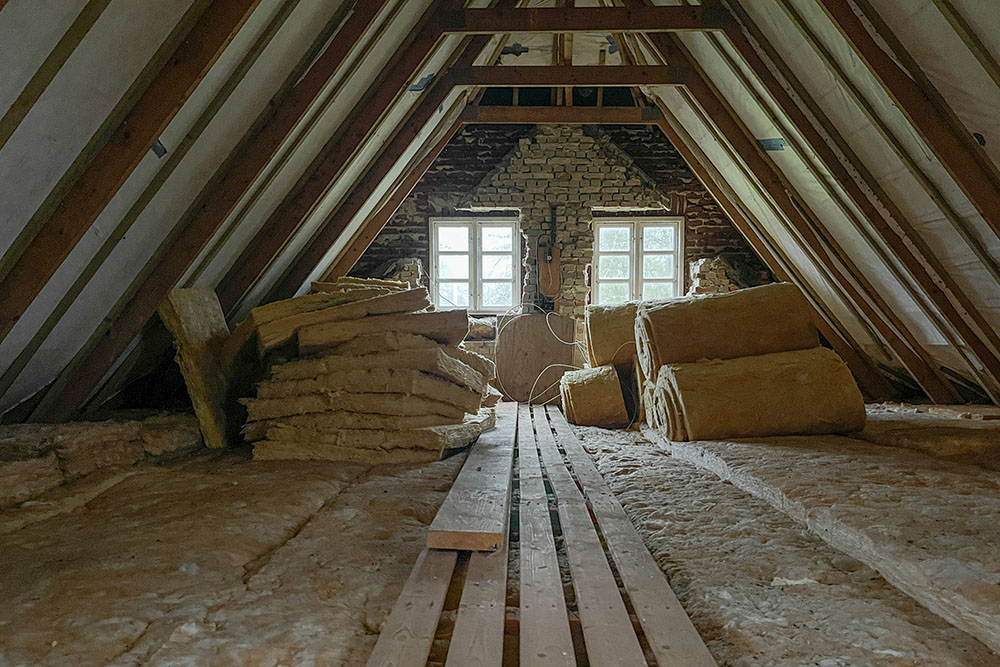How Long Does Insulation Last?

CONTENTS
- How long do certain insulation materials last?
- What can influence the lifespan of insulation?
- What are some signs that your insulation needs replacing?
- How you can increase your insulation's lifespan
- Can regular inspections increase insulation lifespan?
- How to upgrade and replace old insulation
- Frequently asked questions
- Get in touch
Understanding how long insulation lasts is crucial for maintaining a comfortable, energy-efficient home. Different materials, from fibreglass to spray foam, have varying lifespans influenced by factors, like installation quality and environmental conditions.
We at ICE Thermal offer thermal insulation installation services for various domestic and commercial buildings throughout the UK. Whether you need to improve your insulation or replace old materials, we can help. Our team of experienced engineers create a custom plan tailored to your insulation needs.
Read on to learn how to improve the durability of your insulation and why it is crucial to conduct routine checks.
How long do certain insulation materials last?
Fibreglass
This popular choice for many homeowners typically lasts up to 100 years if kept dry and undisturbed. The durability of this insulation choice offers long-term savings, making it a cost-effective solution.
Cellulose insulation
Made from recycled paper products and treated for fire resistance, cellulose can last around 20 to 30 years. However, its life expectancy might decrease if exposed to moisture or improper installation practices.
Spray foam insulation
This insulation can expand and fill gaps effectively, having an indefinite lifespan under ideal conditions. However, it requires correct application techniques for optimal performance.
Mineral wool insulation
This fire-resistant material can also last indefinitely when properly installed and maintained. It provides excellent soundproofing besides thermal regulation.
What can influence the lifespan of insulation?
The durability and effectiveness of insulation are not guaranteed, as they depend on several factors. Initially, the type of material utilised well affects its longevity and performance.
For example, fibreglass can last up to 100 years if left undisturbed, while spray foam might have a shorter lifespan due to its composition.
Installation quality is also important. Properly installed insulation can achieve its maximum potential lifespan, but poor installation can lead to early degradation.
Environmental conditions, such as moisture and temperature fluctuations, reduce the life expectancy of your property's thermal barrier.
Building use can also impact how long your insulation lasts. A commercial building with high internal heat may stress insulating materials more than a residential home would.
Creating a schedule for maintaining your investment and adhering to the manufacturer's instructions can also increase its lifespan significantly.
What are some signs that your insulation needs replacing?
Identifying the signs indicating your insulation requires replacement is essential for preserving a comfortable habitat and optimising energy conservation. Some common signs include:
- An unexpected increase in heating or cooling bills
- Uneven temperatures between rooms
- Ice dams forming on the roof in winter
- Water damage or damp on walls
- A draught is present in some rooms
- Mould growth despite regular cleaning
- Excess moisture in your loft
- The presence of pests like wasps or rats
How you can increase your insulation's lifespan
Maintaining your home’s insulation is integral to reducing costs and protecting the environment. Regular maintenance prolongs its durability and guarantees energy conservation and financial benefits as the seasons change.
Firstly, regular checks are important. Look out for damp spots or mould, as these are indicators that moisture may be compromising your insulation. Tackling leaks early on prevents difficulties down the line.
Another step is to keep pests at bay. Rodents can nest in warm insulation and cause damage in doing so. Seal up any entry points and consider pest control services if necessary to protect this area of your home.
Lastly, consider professional assessments every few years, especially before extreme weather is due to occur. Professionals can identify issues that might go unnoticed by you, offering customised guidance to ensure everything remains safe and functional.
Can regular inspections increase insulation lifespan?
Regular professional inspections are integral to identifying potential issues with your insulation before they worsen. Routine examinations can uncover damp, infestations, and areas where the insulation has either compressed or split apart, causing a drop in energy conservation efficiency.
Early detection through these assessments allows for timely interventions. Fixing minor problems immediately can prevent more significant damage that could shorten your insulation's lifespan.
By acting ahead of time, you are lengthening the life of your insulation and ensuring it works as efficiently as possible. This translates to noticeable savings on your energy expenses over time.
Maintenance prolongs the life of your installation and is a cost-effective strategy for homeowners looking to maximise their investment and energy savings. Regular inspection schedules vary depending on material type and environmental conditions, so starting with an annual check is best.
How to upgrade and replace old insulation
Navigating the process of improving or replacing old insulation within established properties is difficult and beneficial. Restoring your building's insulation can improve indoor comfort, reduce heating bills, and make it more energy-smart.
The first step involves assessing the current state of your building's insulation. Signs such as uneven temperatures, high energy bills, and visible wear on existing material indicate it might be time for an upgrade.
You must choose the right insulation material that suits your building's specific needs while considering factors like thermal performance, moisture resistance, and environmental impact.
Professional assessment is best to ensure accurate identification of areas needing improvement. They can also offer guidance on the most suitable materials and installation methods, ensuring it is done correctly.
Frequently asked questions
How often should insulation be replaced?
Insulation may require replacement every 15 to 20 years, but watch for early signs of wear.
Does insulation lose its effectiveness over time?
Yes, insulation degrades gradually, impacting energy bills and comfort levels in your home.
How do I know if I need new insulation?
Draughty rooms, uneven temperatures, and higher energy costs are indicators that you require new insulation.
How often should you replace loft insulation?
Replace loft insulation roughly every 40 years unless damage or degradation suggests doing it sooner.
Get in touch
If you need thermal insulation installation services, you can rely on the engineers at ICE Thermal. Our team will analyse your property and create a personalised construction plan to ensure your property receives the best insulation based on its size, location, and structure.
To learn more about our thermal insulation services, you can call our team at 020 3376 4802 or send an email to [email protected]. We operate 24/7 nationwide, all year round to help you with your insulation needs.

Speak with me today,
I’m here to help
By asking you a few questions either via phone or email I can immediately provide a realistic estimation of the cost.

Why choose us?
- Cater to a wide variety of cleaning situations
- Nationwide coverage, available 24/7
- Cater to commercial and domestic clients
- Free survey provided prior to quotation
- Emergency response team
- Offer a bespoke service designed to suit all your needs
- All technicians hold professional health and safety qualifications, including BICSc, IOSH, Dewpoint Professional & Safe Contractor
We’re fully accredited
We place best practise, professional expertise and health and safety at the core of our business. We’re fully compliant with all legal obligations. You can view a list of our accreditations below, or visit our Health & Safety page for more information.











-RGB-small.1707319151.jpg)




















